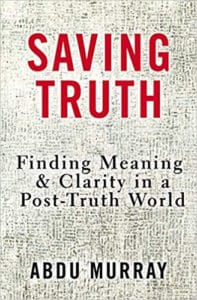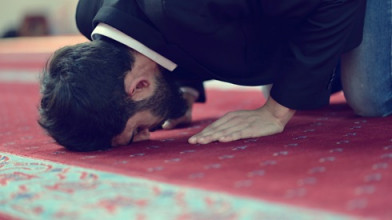Excerpt:
Abdu Murray: The greatest myth about communication is the belief that it actually has occurred when it hasn’t. People often listen to respond, not to understand. And Dave and Pete, though not perfect, they often listened to understand me. And then it was catchy. It’s a very catchy thing. You get infected with this sort of posture of listening to understand. And that started the journey.
End of Excerpt
John Fuller: And his journey was from being a devout Muslim to becoming a strong Christian. That’s Abdu Murray, describing the friends who witnessed to him. And you’ll hear more of his story on today’s episode of Focus on the Family. Your host is Focus president and author Jim Daly, and I’m John Fuller.
Jim Daly: John, when it comes to evangelism, many Christians quote the verse from 1 Peter that says, “Always be prepared to give an answer to everyone who asks you to give the reason for the hope that you have.” But we can’t miss the next part of that verse. It says, “But do this with gentleness and respect.” And that’s so important. And as we heard from Abdu in the first part of our conversation, it was the respect he felt from his friends Dave and Pete that eventually led him to the heart of God. Today we’re going to continue this discussion with Abdu so that we can prepared when someone asks us those questions as well.
John: And if you missed the first part of the conversation, you can find links and details at focusonthefamily.com/broadcast. Abdu Murray is the senior vice president for Ravi Zacharias International Ministries, and he also hosts a radio program and podcast called The Defense Rests. He is an author and his book is called Saving Truth: Finding Meaning and Clarity in a Post-Truth World.
Jim: Abdu, welcome back to Focus.
Abdu: Great to be back. Thanks.
Jim: So good to have you – and what a – you know, first of all, Ravi is a friend. What a great ministry…
Abdu: Oh, yeah.
Jim: …that the Lord has laid upon him and the team there. And I’m so grateful that you’re part of it.
Abdu: Me, too.
Jim: It’s powerful.
Abdu: Oh, yeah. Absolutely.
Jim: We left off last time wanting to come back and talk about the post-truth environment that we live in.
Abdu: Yeah.
Jim: And you – you have a story, I think, that will set this up well for us. You were on, uh, a car ferry somewhere.
Abdu: Yeah. Yeah.
Jim: What happened?
Abdu: And so, I, um, live in Michigan. And, um, I travel a lot internationally. But sometimes I get to travel internationally to Canada. And because I live in Michigan, Canada is the country to my south, believe it or not. And I can either use a bridge or the tunnel. But this particular engagement I was speaking at in the – Wallaceburg, Ontario, required me to take a car ferry over. Now, I’m from a Great Lakes state. I mean, we have ocean-sized lakes that surround my state. So, when I say car ferry, I think of a ship that can carry thirty, forty cars. Well, that was not this car ferry.
Jim: (Laughter).
Abdu: I was crossing the river. And this white, rickety thing with paint peeling off of it held two cars maximum.
Jim: (Laughter) Oh, man.
Abdu: And I was thinking, “This guy’s going to pull me across the river like Lord of The Rings style, you know, with, like, a rope or something.”
(Laughter)
Jim: Yeah.
Abdu: Um, so I get on this ship – uh…
Jim: It’s a ship – boat.
Abdu: Not ship – it’s a boat. It’s a boat.
(Laughter)
Abdu: And, um, I’m terrible with directions. I can get lost in my own house. And so now I have a GPS and – which atrophies my abilities, which are already bad in the first place. So, I’m looking at this GPS constantly because I’m going to cross international waters. I’m gonna go to Canada. I wanna make sure I’m not gonna get lost. Well, the guy said, “Stay in the car. It’s gonna be a short trip.” So, I stayed in the car.
Jim: (Laughter).
Abdu: I looked down at my GPS just as the boat left. So, I didn’t see us leave. But because I was in the car, the suspension and the mass absorbed the energy of us leaving, so I didn’t feel us leave the car. So I looked up, and I had that strange vertigo you have, you know, where you’re at the intersection, and the bus is next to you, and it goes forward, and you’re not quite sure if it’s going forward or you’re moving backward.
John: You’re moving backwards. Yeah, I’ve had that. Yeah.
Abdu: So, a panic sort of sets in. So, what do you do? You look for a fixed point of reference. You look for a mailbox or a building or a streetlight – whatever it is – to determine if you’re moving or not. Well, I was on a river. Everything is moving. And if the boat can’t help me – because I’m on the boat – and the river is moving constantly. So that vertigo and that nausea stayed for quite some time. It’s when I saw the distant shore actually approaching, I could say, “I am moving. I’m OK. I got my bearings.” And that’s when the vertigo and the nausea went away. That’s what I – when I – it struck me. Culture is like this. We no longer have fixed points of reference. We are awash in the river. But we’ve left dry land so long ago that we have our sea legs now. And so, when we feel stability, that feels foreign to us.
Jim: Hmm.
Abdu: And so, we like being in the river. But it does cause confusion. And it does cause vertigo. And I think, if I were to sum up an illustration of a post-truth culture, it’s that we recognize that dry land exists – we recognize that truth exists – but we like being in the river where we can steer our own ship, and there are no fixed points of reference.
John: Hmm.
Jim: When it’s almost as if – and it is, actually. If you speak in – in absolute terms, like, “You can know truth…”
John: Mm hmm.
Jim: …People are really uncomfortable with that now.
Abdu: Yeah.
Jim: I mean, college campuses are awash in that. “You can’t say that.”
Abdu: Right. And…
Jim: “Your truth is your truth. My truth is my truth. And can’t we just get along?”
Abdu: And that was – got its real sway when postmodernism was strongest. You know, it was birthed in the ’50s, ’60s, sort of came into its adulthood in the ’80s and ’90s. I think it’s actually on life support.
Jim: Hmm.
Abdu: I think post – postmodernism’s on life support. But as it dies, there’s something else rising up from the ashes, and that’s post-truth. Now, there’s a subtle difference, I think, and the difference does make a difference. So, postmodernism was the denial of truth as a category. So, the postmodernists said, “Look – all these religious wars and these ideological wars all started because one set of people claimed to have the truth, and they tried to impose it on another set of people. So, if we abandon the idea of truth, no one will think they have it, and no one will fight anymore,” which, of course, didn’t work. But it was a noble-minded idea but wrongheaded. So, you could argue with someone who’s postmodern. When you say – and there’s been plenty of guests on the show, I’m sure – uh, and I’ve listened to them, by the way – who’ve said things like, “When someone says, ‘There’s no such thing as truth or this is my truth or whatever,’ you can simply respond to them and say, ‘When you say there’s no such thing as truth, that statement is either true or it’s false.’”
Jim: (Laughter) Right.
Abdu: “If it’s truth, then truth exists. If it’s false, why did you say it?” So, you can argue somebody out of postmodern thinking. Post-truth is different. Post-truth is loosely defined as the elevation of feelings and preferences above facts and truth. So, postmodernists denied that truth existed. A post-truth person acknowledges that truth exists but says, “I don’t care.”
Jim: Hmm.
Abdu: And that’s a much more difficult thing to address because when you give them logic and reasoning, they’re like, “Yeah. And I don’t care.”
Jim: Right.
Abdu: “Because my preference matters more.”
John: Is that, in some way, Abdu, saying, “There is truth. It’s my – my definition of what is actually the truth now”?
Abdu: Well, I think that it’s actually a little more subtle than that.
John: OK.
Abdu: What’s happening is that you hear this phrase, like, “Tell your truth. Tell your” – what they mean is tell your perspective. And I think that the problem with the culture is, what is my truth is basically defined as what is my perception of reality.
Jim: Mm hmm.
Abdu: And you have no right to tell me I’m wrong. And that’s different than saying, “I define truth.” They’re saying, “No, there is truth. And if the truth lines up with my preferences, then I’ll be all set.”
Jim: Then it’s really true.
John: (Laughter).
Abdu: Then it’s really true. Right. But if the truth happens to knock against my preferences, I’ll either lie about it or ignore it altogether.
John: Yeah.
Jim: Well, and there’s, you know, no greater arena of that occurring right now than in the political arena.
Abdu: Yeah.
Jim: I mean, because we can’t even get on the same page with what actually happened.
Abdu: Mm hmm.
Jim: Right?
Abdu: Well, it’s interesting because the – the – the word post-truth was coined, I believe, in 1992. And in 2016, one of the most contentious election years we’ve ever had, the word post-truth was used two thousand times more in the one year than in the previous years combined.
Jim: Wow.
John: Hmm.
Abdu: And this is why Oxford English Dictionary’s named its word of the year in 2016 as post-truth because we are now engaged in a world where appeals to emotion and feelings matter more than appeals to facts and logic.
Jim: Well, and that idea of preferences – I like that. That captures it.
Abdu: Yeah.
Jim: You also talk in the book Saving Truth about this idea that confusion is a virtue now.
Abdu: Yeah. When you think…
Jim: I mean, that’s – that’s really – that’s terrible.
John: That’s odd.
Jim: Confusion is a virtue?
Abdu: It is because we like being in the river. Um, think about this. Think about the situations you find yourself in. If you are clear on, um, sexual boundaries and that there are sexual morals we need to, uh, adhere to, that’s considered bigoted. If you are clear that there are moral strictures within which we have to live, that you don’t define morality based on your own autonomy. Well, that’s considered regressive. And if you’re clear that there’s only one way to God, for example, that’s considered intolerant.
Jim: Mm hmm.
Abdu: So bigoted, regressive, intolerant from clarity’s sake – but if you’re confused sexually, you become a hero. You become lionized as this person who is deep somehow. And if you’re confused about morals and moral boundaries, well, that’s considered progressive. So that’s another positive-sounding word. And if you’re confused that maybe not all religions are against each other and maybe they all have equal validity or equal invalidity, um, well, that’s considered tolerant. So, if you’re clear, you’re a bigot, you’re regressive, and you’re intolerant. If you’re confused, you’re a hero, you’re progressive, and you’re tolerant.
Jim: Wow.
Abdu: So, clarity becomes a sin while confusion becomes a virtue.
John: Wow.
Jim: There’s something in Proverbs about this, right?
John: (Laughter).
Abdu: There’s a – yeah. There’s a little book that we should all read…
Jim: Yeah.
Abdu: …that actually discloses some of this stuff.
Jim: I mean, this is amazing. Um, a hard truth that you talk about in the book – you – you say that, many times as Christians, we’re contributing to the problem.
John: Yeah.
Jim: This is that moment in a program where we got to buckle in and say, “OK, truth is good.”
John: Yeah.
Jim: I mean, again, the Proverbs says, “The wound of a friend is a good thing.”
Abdu: Mm hmm. Indeed.
Jim: And we’ve got to be able to apply truth to our own behavior, our own, uh, worldview, so that we can improve in our relationship with Christ, right?
Abdu: Absolutely. And…
Jim: And so, in that context…
Abdu: Yeah.
Jim: How are we as Christians contributing to the problem?
Abdu: Well, there’s two ways we’re contributing to it. One is either, we’re making the Gospel so palatable to the culture that we’ve actually compromised on biblical truths, or we’ve done a pendular swing the other way, where we’re so stuck on “This is what the Bible says, and I will club you over the head with it if I have to,” that we exclude people from wanting to hear the Gospel in the first place. So, either were too nice, or we’re too mean. But in the effort, I think, to either be too mean or too nice, we distort the truth itself. So, we’ll compromise on Biblical passages that are tough, culturally tough. Um, or we’ll – and we’ll make it more palatable to a certain group, saying, “Well, we want to include you within the – uh, the ranks of the church, so we’ll make it so it’s accepting.” Or we’ll make it so hard that we don’t want you in the church. Um, an example of that was specific to me in 2015. In 2015, as you know, the Obergefell decision happened, when the Supreme Court legalized same-sex sex marriage. And as a lawyer, I noted this, saw of legal reasoning or, frankly, lack thereof. Um, but then I saw all -this – this deluge in my inbox and in my social media feeds of people saying, “There are gay activists now who are suing two Christian publishers to get the Bible banned as hate speech, using Obergefell as precedent, saying, ‘This is now the law of the land. And if you say that same-sex marriage is wrong, that’s hate speech, and it should be banned, uh, under the First Amendment.’” So, I’m like, wait a minute. That can’t possibly be true. So, it took me three minutes – three minutes – a commercial’s break worth of research time to find out it wasn’t true. Now, what had happened was, yes, a gay – a gay man had sued two Christian publishers in federal court over the Bible. But he didn’t want it banned. What he wanted was it to have be – to be retranslated to be same-sex affirming. And he wanted monetary damages because he – he thought that he – he incurred emotional distress over a mistranslation of the Bible because he was gay, and he thought that it was affirming when they were translating it wrong.
John: Hmm.
Abdu: That lawsuit not only was not about banning the Bible, but it wasn’t after Obergefell. It was seven years before Obergefell. And it was dismissed in thirty days as frivolous. I actually know the judge who dismissed it.
John: Hmm.
Abdu: The problem was, it was people who were bearing the moniker of Christ, who is the way, the truth and the life, who were – who were propagating this story as if it were true. And it wasn’t true.
John: What was their rationale?
Jim: Well, they probably had not checked it out.
Abdu: And that’s exactly what’s going on.
Jim: Yeah, they’re just being lazy.
Abdu: Is that that hadn’t checked it out. And, um – but this goes back to something C.S. Lewis said. Lewis made this wonderful, uh, statement, and it’s – it’s convicting. He says, “Supposing you hear of some atrocity that’s committed in some faraway land or even in your neighborhood, and then you hear later that the story wasn’t quite as bad as you thought it was in the first place. What is your first reaction? Do you say, ‘Thank God. Not even they are as bad as that.’ Or are you disappointed, wishing that they were actually as bad as possible? Or do you cling to the first story, knowing it’s not true, because you want your enemies to be as bad as possible?” And C.S. Lewis said the conclusion – he says, “If we start down that path, we will find ourselves to be devils, indeed.” I think that there is a thing happening within the church where we see – you know, we have this phrase, the speed of light, which we used to connote the idea of speed and things happen fast. The new word should be the speed of lies because nothing travels faster…
Jim: No.
Abdu: …than a falsehood. But truth is slow. And we get so nervous about it that we want to, uh, press like or share or whatever it is on our Facebook feeds or our Twitter feeds because we want to counter the falsehoods. The problem is, we get caught up in the falsehoods our self. As people who follow the truth, we not only owe ourselves and the culture but also our Savior better.
Jim: You know, practical parenting help is really important to us here at Focus on the Family. It’s – it’s probably a lot of what we do here…
John: Mm hmm. Absolutely.
Jim: …to help parents help their children grow in their faith, et cetera. You have something with your own children that you’ve done over the years called spot the true, spot the lie.
Abdu: Yeah.
Jim: I think some of us probably have done that game in different ways watching an ad on television or something. So, explain what you’ve done, and maybe others can do it, too.
Abdu: Yeah, and it – it originally started off with a spot the lie kind of a thing ’cause I wanted to get my kids, like, savvy enough. The problem with that is that if you teach them to spot the lie, they become cynical.
Jim: Right.
Abdu: And everything is a lie, and no one can be trusted. And I don’t want them going through life like that.
John: Yeah.
Abdu: So, we modified it to spot the truth and spot the lie. So, what’ll happen – so watch a television show, for example, and there’ll be a – a show that has this mixed message of family values coupled with something we don’t necessarily agree with. The show – a good example is this show This Is Us. The father in that show is a strong guy. He’s one of the few instances on television where the father’s not either a moron or somehow morally bereft. Um, but there is an agenda that I think goes against certain Christian principles. So, we use that show as a, uh, time to say, what’s true? That it’s good to be a moral, upstanding guy who stands by your convictions. What’s false? This other – these other issues here. Give you an example, though, where it’s not so blatant, but you have – if you – if you hone the skill, spot the truth, spot the lie, your kids will see it even when it’s not obvious. So, you know, one of the very few – ’cause there’s not a lot – of family entertainment on television anymore – uh, it used to be the case that you could watch one of these, uh, sort, um, reality show competitions.
Jim: Right.
Abdu: You know, where they’re singing and all this stuff or they’re juggling and, you know, that kind of thing. So, we’re watching one of these. And really, these are all about the backstories for the – for the contestants. The person with the saddest backstory ends up winning the contest. So, we’re watching one of these. And a series of vignettes on the backstories of some of the most talented contestants comes on. The first one is of a young man, very, very handsome, excellent singer. And he was overweight when he was a kid and he was bullied. Uh, and then he came out as gay, and he was bullied even more. Next vignette was over a comic who’s transgendered. And he was talking about all the difficulties he’s had, uh, with being transgendered and the comments he would get and the snide remarks and the jobs he wouldn’t get – very, very sad. The next story is of a couple; both are Christians, and they’re singers. They have a band. And they – the story was they got kicked off – out of their church because they had a child out of wedlock. They weren’t married yet and they had a child out of wedlock. So, I said, “Whoa, pause, pause. What’s the truth? What’s the lie, guys? What is it?” And we went through it. And the ultimate story here is the truth. It’s wrong to make fun of people ’cause they’re gay. It’s wrong to treat transgendered people badly just because they’re transgender. Um, the lie is the church is intolerant and bigoted and it will kick you out ’cause it’s so judgmental. Because the reality behind that story, by the way, when you find out the true story behind that couple, is they were asked to step down as worship leaders in their church. They got married. They repented. They had this wonderful, flourishing family. And their faith is actually quite robust. And their church relationships are restored. You didn’t hear that part. So, when you – when you learn to spot the truth and spot the lie even when the lie isn’t so obvious, there’s times when you can say, “Look at the juxtaposition. They’re trying to say this level of tolerance for people who are gay, or transgender is the ideal, and this judgmentalness, this should be shunned.” And it’s not overtly stated, but it is there right in the format. So, spot the truth, spot the lie has become something that we’ve done. My wife will tell you this. I never go to the movies. I go to a social commentary kind of party where I watch a movie.
John: (Laughter).
Abdu: It could be as silly as something like Star Wars, which I love from my growing-up years, or something as profound as, um, The Godfather movies or whatever it might be, and an analysis happens every single time. And if I take my kids to see Frozen 2 or whatever it might be, an analysis has to occur because let’s not forget everyone – everyone – has an agenda. And it’s not bad to have an agenda. It’s just, what is your agenda? And we have to figure it out. Don’t be so naive to think that there is any such thing as completely agenda-less entertainment ’cause it doesn’t happen.
John: Well, our guest on Focus on the Family is the author of a book called Saving Truth: Finding Meaning and Clarity in A Post-Truth World. We’re talking today to Abdu Murray. And, uh, I wanna encourage you to get this book and other resources as well at our website. Or give us a call if you have questions. Our number is 800-A-FAMILY. Online, we’re at focusonthefamily.com/broadcast.
Jim: Abdu, I want to move to, um, an idea – again, a – a debatable statement. Um, a major reason people reject the Bible is because they think it stands against human freedom. You’ve touched on that…
Abdu: Yeah.
Jim: …to some degree. Um, but it’s actually for human flourishing.
Abdu: Mm hmm.
Jim: But as we say, “Watch out; don’t do that; don’t go that way,” they hear it as, “They hate us.”
Abdu: Yeah.
Jim: And there – there just seems to be a different vocabulary going on, again, in a post-truth world. They can’t understand that we actually lovingly want them to know about the Good News so that their lives will be blessed.
Abdu: Yeah, absolutely. I think you hit on the word too – though, the different vocabulary. Um, Os Guinness once said – I think it was Os Guinness who said that, “You can always tell the health of a culture by how it’s treated its chief virtues.” And what is the chief virtue of Western democracies? Freedom. We use this word all the time whether we’re screaming it at the end of Braveheart, or we watch The Patriot, or we watch Amistad. We love these movies where freedom is won. We love this. And, of course, we should. We ought to. The problem is, is we’ve stopped knowing what freedom means. So, we use the word quite a bit, but we don’t know what it really means. We have stopped talking about freedom, and now we’re talking about autonomy. And those are not synonymous. Autonomy comes from two Greek roots – autos, meaning self, and nomos, meaning law. So now we believe that we can be laws onto ourselves, which means that I can say, think, act or even be whatever I want, whenever I want, in whatever way I want. And we think that’s freedom. That’s not freedom. That’s autonomy. Freedom necessarily has boundaries. It has to have boundaries. Otherwise, it’s chaos. I mean, think about this. In a post-truth world where feelings and preferences matter more than facts and truth, and I’m an autonomous person and my preferences matter more than truth, and another person comes, and they’re a law unto themselves as well, and their preferences matter more than truth, my preferences and their preferences clash. Now what happens? If truth is on the bottom shelf and truth is no longer the arbiter telling us who’s right and who’s wrong, and now it’s preferences, well, whose autonomy wins? It’s not the one whose autonomy is on the side of truth. It’s the person whose autonomy is on the side of power. This is the irony of our age, is that in our pursuit of autonomy, someone is going to end up enslaved. And it’s the one with the quieter microphones or the least amount of guns.
Jim: Yeah.
Abdu: And that’s not only ironic. It’s also tragic. And so, I think that if we truly understand what freedom actually is, we can get back to not being post-truth but being in truth once again.
Jim: Right. This is Yeoman’s work to try to change a culture back to core truth.
Abdu: Indeed.
Jim: I mean, some of us might even say it seems out of reach…
John: Yeah.
Jim: …that we’re – you know, we’re kind of cascading…
John: Past the point.
Jim: …toward a conclusion that maybe the Scripture’s talking about.
Abdu: Well, it could be. It could be.
Jim: I mean, right?
Abdu: Yeah, very well. And – and there’s…
Jim: Well, where right is wrong and wrong is right – many people I know have repeated that.
Abdu: Oh, yeah.
Jim: Man, what kind of world are we in now?
Abdu: Yeah. And, also, the Scriptures that say that if they kill you or persecute you, they think they’re doing a service to God. Um, and I think that that’s happening now as well, where I think, uh, if you’re – if the words conservative evangelical Christian are used in the same sentence, there is a backlash against this. Uh, my own children sometimes experience this. They go to public schools.
Jim: Right.
Abdu: And they experience this. If the word conservative comes out of their mouth, there’s a – immediately, someone will turn on them and attack, as it were. Um, and you have to defend that. The good news is that they’ve been trained on how to defend their beliefs and do it hopefully winsomely. But, uh, I think that you can right the ship. I think we can if we point out the consequences of post-truth. But I’ll tell you this – here’s the glimmer of hope that I have. Um, I’ve been privileged and honored to be a part of a ministry where we speak on college campuses all over the world, some of the toughest places. And sometimes, there’s been up to nine thousand five hundred people in a college stadium – Michigan State University, for example. We filled up the Breslin Center there. And they lined up asking the questions, and the kids wanted answers. I think there’s a glimmer here because the kids have engaged in the post-truth bender, and now they’re in the grisly hangover. And they want something other the hair of the dog.
Jim: Interesting. Yeah. Yeah.
Abdu: They want something true.
Jim: Yeah, I like that. I think that authenticity is coming through. And speaking to our children is sometimes, you know, one of the more difficult things ’cause they’re living with you. They see you in all your goodness and maybe in the not so goodness at times.
Abdu: Indeed. (Laughter)
Jim: And, uh, I think you have a story where your son or your daughter asked you a question…
Abdu: Yeah.
Jim: …that was a little tough. What was it?
Abdu: Well, I’ll tell you – so we’ve encouraged my kids to ask questions from the age of three. Any question you ask us will never be met with anger or shock – any question you ask us.
Jim: That’s good.
Abdu: And they have taken us up on that offer.
(Laughter)
Jim: “Why can’t I have another cookie?”
Abdu: Yeah, and sometimes a little bit worse by a little bit – but they – they’ve taken us up on it. And so, there’s a level of, um – there’s a level of trust there because we’ve lived up to it. We’ve actually lived up to it. So, my son and I were driving somewhere. And my son asked me this question. He said, “Hey, why is it wrong – why is nudity wrong?” We talk about, you know, watching things that are inappropriate because it’s got nudity in it. Why is that wrong? If everyone – if we live in a culture where no one wore clothes, would it still – would we still be up in arms about it? Should we – would we be OK about it? In other words, is it wrong because no one does it? Um, and if you do it, it’s out of the ordinary. Why is it wrong? He was asking me a question on cultural relativism. He was asking me, is morality dictated by culture, or is there an absolute standard? Now, what do you do? Because there are cultures where people wear very little clothes, and no one really notices it kind of a thing. It was an opportunity for me to share with him two things. The first thing was this – is that he is growing up in a generation where social media, you share everything about everything about yourself…
Jim: Yeah.
Abdu: Um, what you ate for breakfast, what you think, what you’re wearing, all these things. And privacy is a – almost not even a value anymore, uh, in this area. So, I see where he’s coming from. But it gave me an opportunity to talk about sacredness and say this – is that, um, you are made in God’s image. And you were made physically on purpose. You – you weren’t just an ethereal being like an angel. You actually have a body. And the reason you guard safe that body is because one day if you get married, you’re going to be able to share something that no one else knows about you or sees about you. And if you give it away early, and if you show the world to – in an immodest dress or by premarital intimacy or sex – because intimacy and sex aren’t the same thing – if you do that, you’re never going to be able to say this thing, this sacredness of my body, I can never share that exclusively with one person. And that’s why I think God wants you to safeguard it because your body is special. It’s not common. And if you show it off to everybody, it becomes common. No one thinks about, you know, fingernails as being this sacred thing because everyone sees them all the time. But there are parts of you that you need to keep sacred and valuable. And it reflects how God thinks of you. So, when you’re married, you get to reflect that divinity, the divinely given gift that God has given to you. That’s why we do it, not because it’s just wrong or it’s socially inconvenient to expose yourself. It’s that it’s actually a reflection of the sacred that allows you to hide this so that you can give it beautifully to someone else.
John: Yeah.
Jim: That is so good. Wow. Well, I hate to end our conversation, Abdu, but we’re out of time. And this has been a great couple of days. Let me turn to our listeners—please, don’t let your study and exploration of these crucial topics end with this broadcast. Get a copy of Abdu’s book, Saving Truth: Finding Meaning and Clarity in a Post-Truth World. And if I could encourage you, get on board with our mission here at Focus and become a monthly sustainer. It doesn’t have to be much to make a huge impact. And over my years here at Focus, I’ve seen God provide through our support team that’s made up of a lot of you the listeners giving just a little bit. And I want to say thank you for doing it.
John: Mm hmm. And if you’d be willing to become that monthly sustainer, um, contributing on a regular basis or even if you can just only give a one-time gift of any amount we’ll send a copy of Abdu’s book to you as our way of saying thank you.
Jim: And, Abdu, I just want to say, I’m so grateful for how the Lord has brought you along. Um, you know, the great Scripture that says, “They overcome the evil one through the blood of the lamb and the power of their testimony. ” And, uh, frankly your testimony is a powerful one. Thank you so much for being with us.
Abdu: A great honor, and a pleasure. Thank you so much for having me.
John: And you can donate and get your copy of Abdu’s book Saving Truth at focusonthefamily.com/broadcast or when you call 800, the letter A and the word FAMILY. On behalf of Jim Daly and the entire team, thanks for joining us today for Focus on the Family. I’m John Fuller inviting you back as we once more help you and your family thrive in Christ.



















